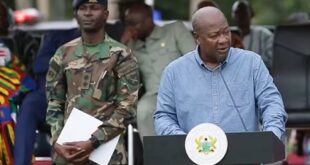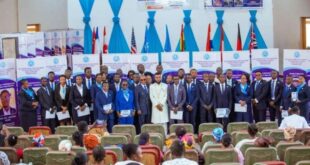We respect the right to worship and we tolerate diverse beliefs however, a huge number of Ghanaians subscribe to Christianity and Christianity is the dominant “religion” in Ghana.
Ghana has been referred to as the Christian Country on many counts by some of our African counterparts. The influx of several denominations and fake pastors under the Christian fraternity is gradually breeding a lack of interest in the Church for most Ghanaians.
The bile image being created by these fake pastors of the Church, as a result of luring, deceiving, and stealing from their vulnerable congregation is becoming rampant in Ghana.
Our overly sensitive approach to religious matters and conviction of our religious beliefs has been mentioned on several occasions as one of the major reasons why we keep deteriorating and regressing as a nation and a continent as a whole.
Despite all the brouhaha and negativity surrounding religion in our country, some Churches are brightening their corner by contributing immensely to the development of the Nation.
Let’s throw some positives amid the negatives; shall we?
Here’s a list of the top 7 Churches contributing immensely to aid in the development of Ghana in no particular order;
Lighthouse Chapel International
United Denomination: Lighthouse Group of Churches (formerly Lighthouse Chapel International) is a Pentecostal Christian church founded in 1987 by Dag Heward-Mills and headquartered in Accra, Ghana. It is considered to be one of the leading charismatic churches in Ghana and has over 3000 branches in many other countries in Africa, Europe, Asia, the Caribbean, Australia, the Middle East, and the Americans
The denomination maintains a humanitarian ministry to widows, prisoners, the blind, and the poor in society as well as the sick. It also founded an orphanage, the Lighthouse Christian Children’s Home, to cater for orphans and a primary school, the Lighthouse Christian Mission School (now St. Adelaide Schools) to ensure their education. There is also a hospital, The Lighthouse Mission Hospital & Fertility Center (LMHFC). These outfits are under the management of Heward-Mills’ wife, Lady Rev. Adelaide Heward-Mills.
The Church has over 30,000 Members according to Wikipedia.
International Central Gospel Church Ghana (I.C.G.C).
The International Central Gospel Church (ICGC) is an evangelical, Charismatic Christian church headquartered at Abossey Okai in Accra, Ghana. It is considered to be one of the fastest-growing Charismatic churches in Ghana, having a church attendance of close to 50,000. The headquarters is Christ Temple and is located in Abossey Okai, Accra Ghana.
The church has made a significant socially responsible contribution to Ghana. The Central University College, a privately owned co-ed tertiary educational institution, is owned by the church. It is currently the biggest private university in Ghana. In 1988, the church started a scholarship scheme called Central Aid to finance the education of selected needy students in pre-tertiary educational institutions. Central Aid is one of the largest non-governmental educational scholarship schemes in Ghana. Every year through an annual charity event called ‘Gold, Frankincense and Myrrh’ the church donates to the Children’s Cancer Unit at Korle Bu and since 2011, over 1500 children have benefitted from the annual donations made by the ICGC.
The Presbyterian Church Of Ghana.
The Presbyterian Church of Ghana is a mainline Protestant church in Ghana. The oldest continuously existing established Christian church in Ghana, it was started by the Basel missionaries on 18 December 1828. The missionaries had been trained in Germany and Switzerland and arrived on the Gold Coast to spread Christianity. The work of the mission became stronger when Moravian missionaries from the West Indies arrived in the country in 1843. In 1848, the Basel Mission Church set up a seminary, now named the Presbyterian College of Education, Akropong, for the training of church workers to help in the missionary work. The Ga and Twi languages were added as part of the doctrinal text used in the training of the seminarians. In the 19th and early 20th centuries, the Presbyterian church had its missions concentrated in the southeastern parts of the Gold Coast and the peri-urban Akan hinterland. By the mid-20th century, the church had expanded and founded churches among the Asante people who lived in the middle belt of Ghana as well as the northern territories by the 1940s. The Basel missionaries left the Gold Coast during the First World War in 1917. The work of the Presbyterian church was continued by missionaries from the Church of Scotland, the mother church of the worldwide orthodox or mainstream Presbyterian denomination. The official newspaper of the church is the Christian Messenger, established by the Basel Mission in 1883. The denomination’s Presbyterian sister church is the Evangelical Presbyterian Church, Ghana.
By the end of 2019, the church had about a total membership of 1,015,174 and owned over 2,400 Basic Schools, 30 Senior High Schools, 5 Colleges of Education, 3 Vocational Schools, 4 Nursing Training Colleges, Two university, and five Training Centres. According to the 2019 report of the Committee on Information Management, Statistics & Planning (IMSP) of the Department of Administration & Human Resource Management (AHRM)of the church, it had 4889 churches across the country.
Education is an integral part of the church’s responsibility to the communities it operates in. In general, Ghanaian Presbyterians have high educational attainment. Together with Ghanaian Anglicans, Methodists, and Roman Catholics – Christian denominations that also prioritize higher education, Presbyterians in Ghana were historically disproportionately represented in the upper ranks of government, industry, academia, and professional occupations.[10] The church is the proprietor of more than 2400 basic schools including 487 kindergarten and nursery schools, 984 primary schools, and 399 junior high schools. The church has 30 senior high schools, 40 private schools, 6 vocational institutions, 5 teacher training colleges, 2 research centers, 4 nursing training colleges, and 5 training centers for pastors and laity. In 2003, the church started a university known as the Presbyterian University College. It is located at Abetifi-Kwahu in the Eastern region of Ghana.
The Church and Health.
The church is a member of the Christian Health Association of Ghana (CHAG).CHAG is an umbrella group that unites all the health facilities in Ghana that are owned and run by Christian churches in Ghana. The church is the third-largest provider of healthcare in Ghana, in terms of several health facilities across the country in cities and towns such as Agogo, Bawku, Dormaa-Ahenkro, Donkorkrom, Bolgatanga, Salaga, Tease, Konongo, Duayaw-Nkwanta, Garu, Sandema, etc. Among its 55 health institutions, the church operates four major hospitals, 11 primary health care programs, eight health centers, 13 clinics, 4 nurses’ training colleges, and a technical unit. These institutions provide a substantial portion of health services in the rural areas with a workforce of 1,977 and total hospital beds of 745. Curative, preventive, and promotive services are provided to clients by the facilities in their respective catchment areas. The PHC interventions cover areas such as antenatal care, postnatal care, family planning, nutrition, growth monitoring of children between 0 – 5 years, immunization, health education, environmental sanitation, HIV&AIDS control, prevention, home-based care and counseling, and clinical care at the health centers. The Church is currently the third-largest single provider of health services in the country. The hospitals provide medical specialist services with resident specialists as follows:
Agogo Hospital – Ophthalmology, internal medicine, general surgery, obstetrics/gynecology, and pediatrics
Bawku Hospital – Ophthalmology, general surgery, orthopedic surgery, and obstetrics/gynecology
Dormaa Hospital – Paediatrics.
The church and agriculture Edit
The Presbyterian Church of Ghana was established in 1828 and formalized partnership (Reg No. ACB 146/88) with the then government of Gold Coast now the Republic of Ghana in 1932 to contribute to the Spiritual and socio-economic development of the citizenry of Ghana. To this end, the Church established six (6) Agricultural Service stations in the late sixties in the Northern, Upper East, Eastern, and Greater Accra regions of Ghana to complement the efforts of the Government at poverty eradication in rural communities of the country.
The Church And Agriculture
The Presbyterian Church of Ghana was established in 1828 and formalized partnership (Reg No. ACB 146/88) with the then government of Gold Coast now the Republic of Ghana in 1932 to contribute to the Spiritual and socio-economic development of the citizenry of Ghana. To this end, the Church established six (6) Agricultural Service stations in the late sixties in the Northern, Upper East, Eastern, and Greater Accra regions of Ghana to complement the efforts of the Government at poverty eradication in rural communities of the country.
The Methodist Church Of Ghana
The Methodist Church Ghana is one of the largest and oldest mainline Protestant denominations in Ghana. It traces its roots back to the landing of the Rev. Joseph Dunwell on 1 January 1835 in Cape Coast, in the Gold Coast (now Ghana). The Rev. T. B. Freeman, another missionary, took the Christian message beyond Cape Coast to the Ashanti Kingdom, to Nigeria, and to other parts of the region to become the father of Methodism in West Africa.
For the most part, The Methodist Church Ghana follows the same Sunday worship practices as other Methodist Church branches. The Methodist Church Ghana separates itself from the mainline Methodist Church of Great Britain in approach through the addition of Charismatic elements to the worship services. This approach to worship displays a more vibrant and energetic form of praise.
The Methodist Church Ghana is responsible for a large part of its community’s outreach. Like many other mainline Protestant churches, the church provides formal education through schooling for Ghanaians. This educational role for Methodist Church Ghana, in particular, has helped the country provide a strong educational system that can accommodate the Ghanaian population, which is pivotal because the options for university in Ghana are scarce and competitive.
The Methodist Church Ghana is a big medical care provider in its area, as well. The medical work done by The Methodist Church Ghana has served a vast part of the local community by offering important health services to Ghanaians. The Methodist Church Ghana also took the initiative to remodel and reconstruct a local hospital to broaden its outreach and possibilities for medical care for its community.
Ethnic divisions have plagued the administration of The Methodist Church Ghana. These problems arose from differences in ethnicity regarding power positions and church format. For instance, during an election for the presidency of the denomination in the 1980s, people were vouching for their ethnic president and a conflict of interest between some ethnic groups occurred. Challenges like these have led to dismissals and resignations of ministers, and even the creation of new churches and circuits.
In the 1970s in Ghana, being admitted into university was a difficult proposition due to the small number of schooling options and the extremely low admittance rate, since there were far more applicants than available slots. This led the Ghanaian government to look towards non-governmental associations to make higher education more accessible. In 1974, Dr. John Kofi Agbeti, the first Ghanaian Methodist minister to earn a Ph.D., wanted to create a higher educational establishment that would accept and support all variations of Christianity. In 1998 during their yearly conference, Methodist Church Ghana made Dr. Agbeti’s suggestion for a university a reality and the decision resulted in Methodist University College Ghana, being constructed on a two-square-mile plot with classes beginning in 2000.
The Methodist Church University, Ghana illustrated its core values and ideals with a seven-piece plan:
First, to avail a safe educational environment where students could utilize its programs and resources to learn a liberal and technical education to fit the needs of the country. Second, to sponsor research to harvest knowledge for application towards any problem. Third, to develop the student’s ability to critically think and problem solve. Fourth, to be a home for all students regardless of gender, religion, or racial identity. Fifth, to give students the top professional and innovative training possible. Sixth, to promote hard work and strengthen the student’s connection to their African background. Seventh, to spread Christianity and endorse the giving of the student’s life to God.
Another important school that the Methodist Church Ghana constructed was Cape Coast’s Mfantsipim. This school was responsible for educating John Mensah Sarbah, the head of the Aborigines Rights Protection Society, Joseph Ephraim Casely Hayford, a leader in the founding of the West African Congress, and other prominent figures in African history.[15]
The Methodist Church of Ghana has placed importance on its medical work since its construction. With the help of the government, for multiple decades The Methodist Church Ghana has contributed healthcare services. The division of Health and Sanitation is under the Methodist Church Ghana Board of Social Responsibility and Rural Development. Miriam Hornsby Odoi, a worker for the Diocese who directs The Methodist Church Ghana’s health programs, states that the church’s involvement in medical work comes from Jesus Christ when his disciples were local healers and spirits purifiers. Odoi also states that the importance of medical work is to complete mental, social, and physical well-being.[15] The church controls the Ankaase Methodist Faith Hospital. A congregational member, J. K. Manu, modeled, designed, and built the two-story medical center. A representative of the church then negotiated with the administration for the proper rights to operate and run the hospital. After expanding the property and adding medically trained professionals, on September 24, 1988, the hospital opened to the public. This church uses a combination of westernized medicine with spiritual healing. Since then the church has convinced many investors to contribute monetary donations to the hospital and the church has implemented chaplains to run the medical center. This is now a prominent health center in Ghana.
The Methodist Revival was a movement held by the Methodist Church in Britain to reach citizens who felt neglected by the Church of England.[16] Because many Ghanaian churches also serve as local schools, The Methodist Church of Ghana incorporated this movement for the locals and used this opportunity to educate students about its religion and taught any citizen, young or old to read and write. This also helped educate citizens who previously couldn’t afford school.
The Seventh Day Adventist Church, Ghana.
The Seventh-day Adventist Church is a major Christian denomination with a significant presence in Ghana with over 356,599 members as of June 30, 2018. The country of Ghana is split into two Unions by the Seventh-day Adventist Church.
The Seventh-day Adventist Church operates 4 secondary schools in Ghana. There is also one school of higher education named Valley View University.
The Seventh-day Adventist Church operates 9 hospitals and 8 clinics in Ghana they are: Seventh-day Adventist Hospital, Koforidua; Asamang Seventh-day Adventist Hospital; Akomaa Memorial Adventist Hospital; Bremang Seventh-day Adventist Hospital;[6] Dominase Adventist Hospital; HART Adventist Hospital; Konkoma Seventh-day Adventist Hospital; Kwadaso Seventh-day Adventist Hospital; Obuasi Seventh-day Adventist Hospital; Tamale Adventist Hospital; Valley View Adventist Hospital; Valley View University Hospital; Wiamoase Seventh-day Adventist Hospital; Anyinasaso Seventh-day Adventist Clinic; Apaah Seventh-day Adventist Clinic; Asamang Adventist Health Centre; Asawinso Seventh-day Adventist Clinic; Denkyira-Dominase Seventh-day Adventist Clinic; Nagel Memorial Seventh-day Adventist Clinic; Nobewam Seventh-day Adventist Clinic & Sefwi Kofikrom.
The Catholic Church Of Ghana
The Catholic Church in Ghana is part of the worldwide Catholic Church, under the spiritual leadership of the pope in Rome.
There are three million Catholics in Ghana and the country is divided into 20 dioceses including four archdioceses and 1 Vicariate.
As of October 2020, the Catholic Church had established 45 Hospitals across the country. There is not accurate data online regarding the number of basic schools, senior high schools, vocational/training schools they have established across the country but we all know that it’s an outrageous number. The Catholic Church gave birth to popular and reputable high schools like St. Augustine’s College, Archbishop Porter Girls, Pope Jones SHS (Pojoba), and St. Thomas Aquinas SHS.
The Catholic is believed to have a membership of 3million in Ghana alone around 10 percent of the entire country’s population. Let’s not forget the Catholic University of Ghana.
The Church Of Pentecost Ghana.
The church has its origins in a British mission of Rev. James McKeown (missionary) in Ghana in 1937. In 1962, The Church of Pentecost was founded. Through foreign missionary work and establishing relationships with other Pentecostal churches, the Church of Pentecost expanded into a worldwide movement. The Church of Pentecost currently operates in 105 Nations headed by Apostles, Prophets, Evangelists, and Senior Pastors throughout the world and about 21,802 local assemblies in 2,381 districts. In 2018, global membership of the Church stood at 3,257,943, with children constituting about 1,056,062. The Church of Pentecost had 137,862 church officers and 2,492 ordained ministers in 101 nations.
The Church currently has over 90 basic schools across the country, 2 senior high schools, 2 Skills Development and Learning Centres,
1 Vocational Training Institute,
8 Healthcare Facilities, Credit Unions and the Pentecost University College which was awarded the best private university in the country in 2019. The University received this award at the 2019 Annual PUSAG Congress which took place at the All Nations University, Koforidua.
Source : adwoaadubianews.com
 Home Of Ghana News Ghana News, Entertainment And More
Home Of Ghana News Ghana News, Entertainment And More




